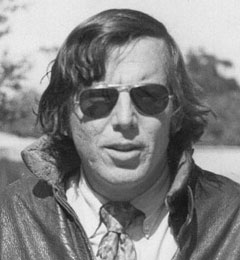| Roots | Discovery | Destiny |
Hero to His People
The fictional autobiography of Gaylord E. Smith
Indeed, it is to that library that my father, Gilderglöcken, and his young wife had recourse to research the meaning of my birth. Only once before in the history of the Slobbs had a child been born unexpectedly in the middle of summer. I refer, of course, to our great folk hero, Prvszchërmr, who in the early part of the eleventh century led his people out of bondage in a Central Asian swamp to a new homeland near the mouth of the Danube. What child of Slobbobian descent does not know by heart his famous exhortation?
Rise up, ye swineherds!
Mom was inspired by a dream she had on the night of my birth to believe that I would be a modern Prvszchërmr. Since this name translates literally to "frolic master" in English, she and Dad chose for me an equivalent English name: Gaylord. (iii) They were —and still are— convinced that I, like my medieval namesake, would someday rescue my people from their afflictions. The reader should know that since my earliest youth I have aspired to fulfill the promise of my parents' dreams.
Growing up on a Texas landfill can be an inspiration to an inquiring, young mind. Poking around in the dirt like an amateur archaeologist, I discovered many artifacts from the past, notably an unbroken antebellum cut-glass brandy snifter, an unopened box of Cuban cigars from 1882, and a series of stereoscopic daguerreotypes of scantily clad buxom wenches. These objects, all associated with vice and corruption, so repelled my youthful sensibilities that I decided to become a teacher, in the hope of spreading knowledge that would free mankind from substance abuse and pornography. To that end I applied myself in school and became so literate that the citizens of the town of New Slobbobia held a massive swap meet to raise money so that they could send me to a place where there was a high school. Eventually, in June of 1957, I graduated 24th in a class of 26 from Clute High School. In fact, I am proud to state that I was the first male in south Texas ever to graduate from high school without having a football coach alter his transcript. Pleased with my achievement, my father sold his prize stud hog to pay my tuition at the University of Texas at Austin.
College passed rapidly since I had no time for frivolous pursuits. In addition to my major in education, I also studied linguistics and history in order to better equip myself for reestablishing the greatness of my people. I spent summers and holidays in basement of the New Slobbobia Public Library where I immersed myself in the archives studying my national heritage. I also taped extensive interviews with the elderly who maintained many of our ancient traditions. I became a master of the flskra,the lively dance for joy the Slobbobian man performs in the nude for his entire village after his sow gives birth to a healthy litter. My arrest for indecent exposure while dancing the flskraduring halftime at the 1963 Cotton Bowl led to the landmark Smith vs. Regents of the University of Texasruling by the United States Supreme Court, which affirmed the right of ethnic minorities to maintain their cultural traditions. In addition, I am the world's leading Slobbobian poet, being particularly adept at the 13-syllable nskërda,which is similar to the Japanese haiku in its terse, enigmatic style. Perhaps the reader is acquainted with my most famous nskërda:
Outside time, dew to dust,
There is, of course, no way that the English translation can capture the ineffable guttural and uvular beauty of the original.
Rise up, oh sons of New Slobbobia,
Roots

Little Gaylord, the future Prvszchërmr
Borne perhaps by a wayward stork, a wailing bundle of joy was delivered to Mergatroid Smith, wife of Gilderglöcken, who until she went into labor was unaware that she was pregnant. This blessed event —my birth— occurred on July 15, 1939, in New Slobbobia, Texas. My ancestors were part of a group of Slobbobians who had immigrated from the old country to the Republic of Texas about 1843, victims of a land swindle. This event turned out to be very lucky for them because, in a little-known corollary to the Franco-Prussian War, the Bulgars subsequently exterminated the Slobbobians in Europe in a routine ethnic cleansing.(i) New Slobbobia was so favorable in comparison to what my ancestors left behind that no one realized until after the dawn of the 20th century that it was actually Houston's garbage dump. With modernization and a landfill operation, the town of my birth became a typical rural Texas town. Since most of the immigrants changed their Eastern European surnames (mine would have been Srmdstünkøffski) to common American ones, a casual visitor to the town today would be unaware that it is the world center of
Slobbobian culture. With its 62 manuscripts written in Old and Middle Slobbobian, the town's library would be the indispensable center for the study of Slobbobian language and literature were anyone interested. Anyone besides me, that is.
Make ready your hogs!
Let's free our children
From these filthy bogs.(ii)
To Top of Page
Discovery
Wind to mud, up befalling.(i)
To Top of Page
Destiny: the Promised Land
Always mindful of the role destiny has in store for me, I have taken a number of teaching jobs with an eye to seeking a new homeland for my people. It is now imperative that I act quickly. Strange diseases have been diminishing the Slobbo-American ranks in Texas. At first, it was thought that these maladies were the result of inbreeding, but recent scientific evidence suggests that they are caused by contamination seeping from beneath the landfill. A few years ago, while I was teaching in Menlo Park, California, I tried to close a deal on some property that I planned to turn into our communal pigsty. The city filed an injunction against the sale of the property, citing zoning laws. On the advice of counsel, I was dissuaded from waging a legal battle against the injunction. The federal courts, then filled with conservative Reagan and Bush appointees, would always favor zoning laws, my attorneys

The idealistic young teacher in 1970
believed, even over such a mainstay of Slobbobian culture as the pigsty. Were I to fight this case in the courts in the prevalent political climate, I risked seeing Smith vs. Regentsoverturned, and then what would we Slobbobians have left of our culture? So I opted to take a job in Monterey County, seeking an area less likely to reject us because of our cultural peculiarities. I believe I have met with success.
It is to the Prunedale area that I shall bring the surviving Slobbo-Americans so that we can renew our great culture. Here abound wetlands and sloughs that will make fine wallowing holes for our animals. Much of Prunedale already has the feel of a pigpen. The clincher is that this is also an ideal region for the cultivation of Brussels sprouts, which are, in addition to pork, a major staple of the Slobbobian diet. (i) My mouth literally waters at the thought of the feast we will have when my friends and relatives arrive beginning this next spring. The transformation of North Monterey County is close at hand. Like Prvszchërmr, I am composing verses to motivate my people, like:
Succumb ye not to any phobia,
Lead your swine still further west
And we'll have a merryflskra fest.
To Top of Page
If you have read my autobiography, please send an me a critique by:

SMITTY'S HOMEPAGE
©2001 Smitty (Gaylord E. Smith)